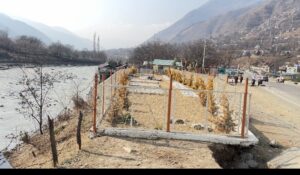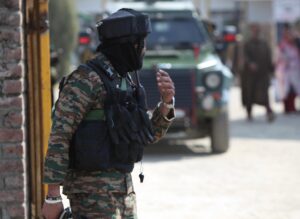Saudi Arabia’s Litmus Test Between Palestine and Power Under the Abraham Accords

Opinion by| Farooq Ah Lone
Will the state of Saudi Arabia recognize Israel? This question continues to spark debate among political and intellectual circles across the Gulf region. As the shadow of the Abraham Accords looms large, key questions persist: Under what conditions might Riyadh normalize ties with Tel Aviv? Will the Kingdom prioritize trade, technology, and U.S. security guarantees—or will it insist on justice and statehood for the Palestinians? The answer, for now, seems firmly grounded in Saudi Arabia’s repeatedly stated policy that normalization is impossible unless and until a sovereign Palestinian state is established. Crown Prince Mohammed bin Salman’s position is clear unless means unless.
Although both Israel and Saudi Arabia publicly support the idea of a two-state solution, Israel’s continued refusal to advance or support the actual creation of a Palestinian state remains the biggest obstacle to normalization. With the ongoing Israel-Hamas war having claimed approximately 60,000 Palestinian lives and 1,300 Israeli lives, the humanitarian catastrophe in Gaza has further hardened Riyadh’s stance. Public opinion in Saudi Arabia is overwhelmingly against any potential deal with Israel. Multiple opinion polls indicate that normalization without a free Palestine would provoke widespread backlash—not only from Saudi citizens but from Muslims and Arabs across the region. Riyadh, currently in a strong diplomatic and security position, sees little benefit in risking its legitimacy or inviting domestic unrest for what would be viewed as transactional gains.
Saudi Arabia today is positioning itself as a modern and globally respected Islamic power. While it continues to modernize rapidly pursuing technological development, economic diversification, and social reform it remains committed to religious values and moral leadership. The Kingdom is investing heavily in its defense capabilities and is forming security partnerships with various countries beyond traditional Western allies. With Iranian influence weakened partly due to Israel’s war with Iran and Iran’s reduced role in Syria Riyadh is leveraging the shifting regional dynamics. As it strengthens ties with Gulf neighbors and cautiously manages relations with Tehran, many analysts believe Israel’s strategic value to Saudi Arabia has significantly diminished.
In international relations, a strong and stable state makes decisions not based on pressure, but on principle and long-term strategy. Saudi Arabia is fully aware of the global and regional implications of any move toward normalization with Israel. At present, the geopolitical climate in the Middle East, coupled with Riyadh’s growing influence in the Muslim world, points to a firm stance: the Palestinian cause remains central. Any normalization attempt that bypasses Palestinian statehood would undermine the Kingdom’s regional credibility and moral leadership. From both a strategic and ethical perspective, Saudi Arabia is likely to remain steadfast in prioritizing Palestine over premature peace or short-lived political convenience.
A few days ago, this happened let’s hope it actually unfolds as planned. In a historic diplomatic shift, Arab countries are set to publicly condemn Hamas and call for its disarmament for the first time during a high-level United Nations ministerial event in New York. This unprecedented move is part of a broader strategic initiative jointly led by France and Saudi Arabia, aimed at paving the way for wider recognition of Palestinian statehood among European nations. French Foreign Minister Jean-Noël Barrot, speaking in an exclusive interview with Le Journal du Dimanche, emphasized that isolating Hamas is a necessary step toward legitimizing a credible Palestinian state. According to Barrot, nearly half of European countries have already recognized the State of Palestine, and others are actively considering it. He noted that the British Prime Minister has expressed his intent to do so, while Germany is evaluating the possibility for a later stage. The UN event is intended to build global momentum, culminating in France’s formal recognition of Palestine at the UN General Assembly on September 21 a move already drawing condemnation from the United States and Israel.
In addition to this symbolic recognition, France and Saudi Arabia are expected to present a comprehensive post-war roadmap addressing core issues such as security, reconstruction, and governance. Designed to align with the Abraham Accords framework, the plan envisions a sustainable path toward a two-state solution. Barrot also stated that the European Commission will adopt a firmer stance on Israeli policies, including a halt to new settlement construction in the West Bank and ending the militarized interference in humanitarian aid distribution. Furthermore, he urged fellow European nations to push for the removal of the financial blockade on the Palestinian Authority, which is currently unable to access an estimated €2 billion in withheld funds. These developments signal a strategic diplomatic recalibration one that may strengthen the Palestinian cause without compromising Saudi Arabia’s moral and geopolitical position.
About Authors : Farooq Ahmad Lone can be reached at lonefarooqahmadir12@gmail.com



